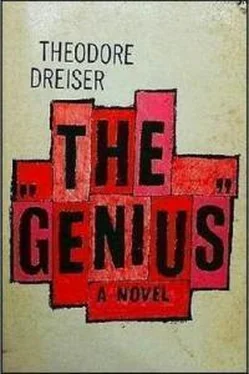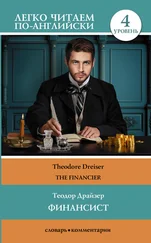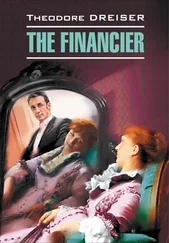Теодор Драйзер - The Genius
Здесь есть возможность читать онлайн «Теодор Драйзер - The Genius» весь текст электронной книги совершенно бесплатно (целиком полную версию без сокращений). В некоторых случаях можно слушать аудио, скачать через торрент в формате fb2 и присутствует краткое содержание. Год выпуска: 2014, Издательство: epubBooks Classics, Жанр: Классическая проза, на английском языке. Описание произведения, (предисловие) а так же отзывы посетителей доступны на портале библиотеки ЛибКат.
- Название:The Genius
- Автор:
- Издательство:epubBooks Classics
- Жанр:
- Год:2014
- ISBN:нет данных
- Рейтинг книги:4 / 5. Голосов: 1
-
Избранное:Добавить в избранное
- Отзывы:
-
Ваша оценка:
- 80
- 1
- 2
- 3
- 4
- 5
The Genius: краткое содержание, описание и аннотация
Предлагаем к чтению аннотацию, описание, краткое содержание или предисловие (зависит от того, что написал сам автор книги «The Genius»). Если вы не нашли необходимую информацию о книге — напишите в комментариях, мы постараемся отыскать её.
The Genius — читать онлайн бесплатно полную книгу (весь текст) целиком
Ниже представлен текст книги, разбитый по страницам. Система сохранения места последней прочитанной страницы, позволяет с удобством читать онлайн бесплатно книгу «The Genius», без необходимости каждый раз заново искать на чём Вы остановились. Поставьте закладку, и сможете в любой момент перейти на страницу, на которой закончили чтение.
Интервал:
Закладка:
"Can you cure sorrow?" he asked grimly and with a touch of sarcasm in his voice. "Can you cure heartache or fear?"
"I can do nothing of myself," she said, perceiving his mood. "All things are possible to God, however. If you believe in a Supreme Intelligence, He will cure you. St. Paul says 'I can do all things through Christ which strengtheneth me.' Have you read Mrs. Eddy's book?"
"Most of it. I'm still reading it."
"Do you understand it?"
"No, not quite. It seems a bundle of contradictions to me."
"To those who are first coming into Science it nearly always seems so. But don't let that worry you. You would like to be cured of your troubles. St. Paul says, 'For the wisdom of this world is foolishness with God.' 'The Lord knoweth the thoughts of the wise—that they are vain.' Do not think of me as a woman, or as having had anything to do with this. I would rather have you think of me as St. Paul describes anyone who works for truth—'Now then we are ambassadors for Christ, as though God did beseech you by us, we pray you in Christ's stead, be ye reconciled to God.'"
"You know your Bible, don't you?" said Eugene.
"It is the only knowledge I have," she replied.
There followed one of those peculiar religious demonstrations so common in Christian Science—so peculiar to the uninitiated—in which she asked Eugene to fix his mind in meditation on the Lord's prayer. "Never mind if it seems pointless to you now. You have come here seeking aid. You are God's perfect image and likeness. He will not send you away empty–handed. Let me read you first, though, this one psalm, which I think is always so helpful to the beginner." She opened her Bible, which was on the table near her, and began:
"He that dwelleth in the secret place of the most high shall abide under the shadow of the Almighty.
"I will say of the Lord, He is my refuge and my fortress; my God; in him will I trust.
"Surely he shall deliver thee from the snare of the fowler, and from the noisome pestilence.
"He shall cover thee with his feathers, and under his wings shalt thou trust: his truth shall be thy shield and thy buckler.
"Thou shalt not be afraid for the terror by night, nor for the arrow that flieth by day. Nor for the pestilence that walketh in the darkness; nor for destruction that wasteth at noonday.
"A thousand shall fall at thy side, and ten thousand at thy right hand; but it shall not come nigh thee.
"Only with thine eyes shalt thou behold and see the reward of the wicked.
"Because thou hast made the Lord, which is my refuge, even the most High, thy habitation; There shall no evil befall thee, neither shall any plague come nigh thy dwelling.
"For he shall give his angels charge over thee, to keep thee in all thy ways.
"They shall bear thee up in their hands, lest thou dash thy foot against a stone.
"Thou shalt tread upon the lion and the adder, the young lion and the dragon shalt thou trample under foot.
"Because he hath set his love upon me, therefore will I deliver him. I will set him on high, because he hath known my name.
"He shall call upon me, and I will answer him: I will be with him in trouble. I will deliver him and honor him.
"With long life will I satisfy him, and show him my salvation."
During this most exquisite pronunciamento of Divine favor Eugene was sitting with his eyes closed, his thoughts wandering over all his recent ills. For the first time in years, he was trying to fix his mind upon an all–wise, omnipresent, omnipotent generosity. It was hard and he could not reconcile the beauty of this expression of Divine favor with the nature of the world as he knew it. What was the use of saying, "They shall bear thee up in their hands lest thou dash thy foot against a stone," when he had seen Angela and himself suffering so much recently? Wasn't he dwelling in the secret place of the Most High when he was alive? How could one get out of it? Still― "Because he hath set his love on me—therefore will I deliver him." Was that the answer? Was Angela's love set on him? Was his own? Might not all their woes have sprung from that?
"He shall call upon me and I shall answer. I will deliver him in trouble. I will deliver him and honor him."
Had he ever really called on Him ? Had Angela? Hadn't they been left in the slough of their own despond? Still Angela was not suited to him. Why did not God straighten that out? He didn't want to live with her.
He wandered through this philosophically, critically, until Mrs. Johns stopped. What, he asked himself, if, in spite of all his doubts, this seeming clamor and reality and pain and care were an illusion? Angela was suffering. So were many other people. How could this thing be true? Did not these facts exclude the possibility of illusion? Could they possibly be a part of it?
"Now we are going to try to realize that we are God's perfect children," she said, stopping and looking at him. "We think we are so big and strong and real. We are real enough, but only as a thought in God—that is all. No harm can happen to us there—no evil can come nigh us. For God is infinite, all power, all life. Truth, Love, over all, and all."
She closed her eyes and began, as she said, to try to realize for him the perfectness of his spirit in God. Eugene sat there trying to think of the Lord's prayer, but in reality thinking of the room, the cheap prints, the homely furniture, her ugliness, the curiousness of his being there. He, Eugene Witla, being prayed for! What would Angela think? Why was this woman old, if spirit could do all these other things? Why didn't she make herself beautiful? What was it she was doing now? Was this hypnotism, mesmerism, she was practicing? He remembered where Mrs. Eddy had especially said that these were not to be practiced—could not be in Science. No, she was no doubt sincere. She looked it—talked it. She believed in this beneficent spirit. Would it aid as the psalm said? Would it heal this ache? Would it make him not want Suzanne ever any more? Perhaps that was evil? Yes, no doubt it was. Still― Perhaps he had better fix his mind on the Lord's Prayer. Divinity could aid him if it would. Certainly it could. No doubt of it. There was nothing impossible to this vast force ruling the universe. Look at the telephone, wireless telegraphy. How about the stars and sun? "He shall give his angels charge over thee."
"Now," said Mrs. Johns, after some fifteen minutes of silent meditation had passed and she opened her eyes smilingly—"we are going to see whether we are not going to be better. We are going to feel better, because we are going to do better, and because we are going to realize that nothing can hurt an idea in God. All the rest is illusions. It cannot hold us, for it is not real. Think good—God—and you are good. Think evil and you are evil, but it has no reality outside your own thought. Remember that." She talked to him as though he was a little child.
He went out into the snowy night where the wind was whirling the snow in picturesque whirls, buttoning his coat about him. The cars were running up Broadway as usual. Taxicabs were scuttling by. There were people forging their way through the snow, that ever–present company of a great city. There were arc lights burning clearly blue through the flying flakes. He wondered as he walked whether this would do him any good. Mrs. Eddy insisted that all these were unreal, he thought—that mortal mind had evolved something which was not in accord with spirit—mortal mind "a liar and the father of it," he recalled that quotation. Could it be so? Was evil unreal? Was misery only a belief? Could he come out of his sense of fear and shame and once more face the world? He boarded a car to go north. At Kingsbridge he made his way thoughtfully to his room. How could life ever be restored to him as it had been? He was really forty years of age. He sat down in his chair near his lamp and took up his book, "Science and Health," and opened it aimlessly. Then he thought for curiosity's sake he would see where he had opened it—what the particular page or paragraph his eye fell on had to say to him. He was still intensely superstitious. He looked, and here was this paragraph growing under his eyes:
Читать дальшеИнтервал:
Закладка:
Похожие книги на «The Genius»
Представляем Вашему вниманию похожие книги на «The Genius» списком для выбора. Мы отобрали схожую по названию и смыслу литературу в надежде предоставить читателям больше вариантов отыскать новые, интересные, ещё непрочитанные произведения.
Обсуждение, отзывы о книге «The Genius» и просто собственные мнения читателей. Оставьте ваши комментарии, напишите, что Вы думаете о произведении, его смысле или главных героях. Укажите что конкретно понравилось, а что нет, и почему Вы так считаете.









